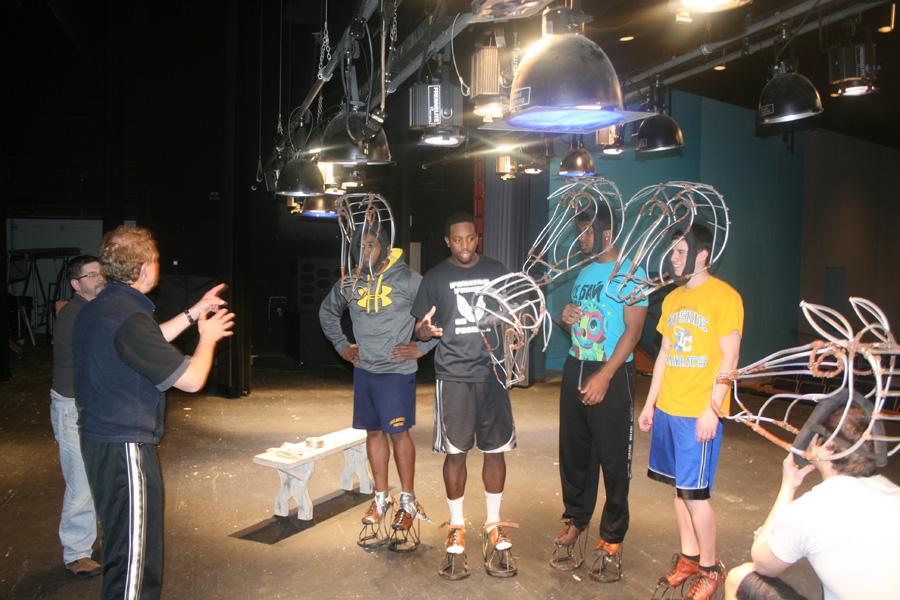Said Charlie Krebs, Associate Professor of Theatre and Speech, of this year’s spring play, Equus, “Most of the time you want the audience to believe the illusion. This time, we’re deconstructing the illusion.”
The play, which premieres Thursday, April 4, is different from those of Lakeland’s past for that reason. It focuses on the idea of perception vs. reality, and it has a very raw, industrial feel to it. Krebs believes that it has the makings to be quite a dark, theatrical, and powerful performance.
The story of Equus—meaning “horse” in Latin—begins with the main character, Alan, played by Todd Szymuszkiewicz, in a mental hospital with his therapist, who will be played by none other than Krebs himself.
“I think it would be good for the students to see if I could walk my talk,” Krebs said, “It’s kind of a challenge to act and direct at the same time.”
Luckily, Thomas Gerleman, adjunct professor of business law, is helping out as assistant director. Gerleman has participated in several Lakeland shows.
The story continues through multiple flashbacks, during which the audience gains the back story of Alan and his “neurotic,” as Krebs puts it, home life. Through events that take place during Alan’s childhood, he ends up confusing the concepts of God and horse. This leads to a troubled life for Alan, who eventually ends up working at a stable where he commits the violent act that lands him in a mental hospital.
The part of Jill Mason, a stable hand, will be played by freshman Sara Pfile.
“I love playing Jill. She’s fun and bubbly, a lot like myself,” Pfile said.
Pfile has been in many plays prior to Equus, but this is the first time she has been in a role as physically involved as this one. “I’ve been putting a lot of work into not only feeling comfortable on stage as myself, but also being able to embrace it as Jill,” she said.
As many students are already aware, Equus originally contained scenes of nudity. This has caused much discussion on campus lately, but Krebs is here to dispel the rumors: there will be no nudity in Lakeland’s rendition of Equus.
“I don’t think it’s necessary,” Krebs said. “ I want people to come see the play for the acting, the story, [and] for the artistry.”
Pfile said, “This show isn’t about a ‘missed chance’ with a girl, or the idea of sexuality. It’s about the confusion of a boy who can’t separate two worlds, and is fighting his way for recovery and acceptance.”
Krebs believes firmly that the play will be able to stand perfectly fine on its own without the nudity. The scene that had previously contained nudity will still be in the play, Krebs said, but it will be done with the actors fully clothed.
Stylistically, the play will have many new and exciting elements. The stage is going to look like a giant diamond, jutting about four or five rows into the audience, taking up about 80 seats.
“We’re going for a very industrial feel,” Krebs said.
The stage will have an 8 by 8 foot section in the middle of it made out of a steel plate. This will have a great effect on the audience, as the five actors who are playing horses will be wearing shoes that are angled in a way that forces them to walk like horses. They even have metal horseshoes on the bottom of them, which will make a distinct sound on top of the metal plate.
The horse costumes in the play are just as industrial as the set design. Each actor playing a horse will wear a large, metal mask, which audience members will be able to see his face through.
“You can clearly see that they’re humans, so as an audience member you have to suspend your disbelief and turn them into horses,” said Krebs.
The stage will also have two benches on the edges furthest away from the audience, on which all of the actors will sit during the whole performance, only leaving their spot on the bench to take on their role in the scene at hand.


